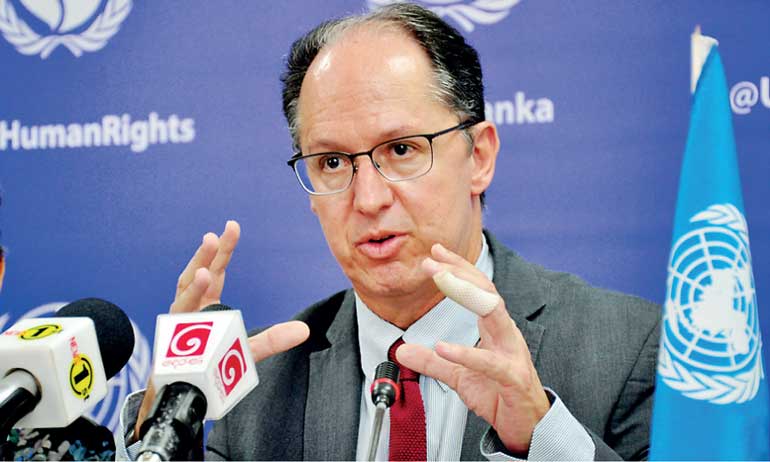Wednesday Feb 25, 2026
Wednesday Feb 25, 2026
Tuesday, 24 October 2017 00:00 - - {{hitsCtrl.values.hits}}
 UN Special Rapporteur on the promotion of truth, justice, reparation and guarantees of non-recurrence Pablo de Greiff speaking to reporters yesterday – Lasantha Kumara
UN Special Rapporteur on the promotion of truth, justice, reparation and guarantees of non-recurrence Pablo de Greiff speaking to reporters yesterday – Lasantha Kumara
By Chathuri Dissanayake
Delays in delivering transitional justice have led the process to be highly politicised, a United Nations (UN) Rapporteur warned yesterday, urging Sri Lanka to move forward with establishing comprehensive programs to redress grievances, warning accountability will be sought abroad if the Government falls short of its commitments at home.
Warning that the criminal case filed against former Army Commander Jagath Jayasuriya was only the “tip of the iceberg”, the Special Rapporteur on the promotion of truth, justice, reparation and guarantees of non-recurrence, Pablo de Greiff, told reporters that the country could expect further similar action if Sri Lanka did not implement transitional justice programs.
He said this while delivering his concluding remarks at the end of a 14-day visit to the country.
De Greiff urged the Government to move forward in establishing comprehensive programs of redress that the country has agreed to, stressing that the failure to do so would “constitute to a denial of justice”.
However, the Special Rapporteur appreciated the Government’s commitment to deliver justice displayed by its continued engagement with the United Nations since March 2015, only two months after being elected to office. The Government has displayed commitment through its willingness to engage and share information, extending five invitations for monitoring visits, he said. Nevertheless, he stressed that the ultimate test was in the manifestation of actions and decisions and not in conversations.
“So much remains to be done,” he said, stressing the need to act immediately to ensure the delivery of justice.
“Additionally, the delays bear some risks of further politicisation of the discussion of the increasing difficulties in finding consensus around this topic,” he warned.
“Delays open up opportunities for the topic to become entangled in partisan politics, as seems to be happening in Sri Lanka. I take the opportunity to reiterate a point that cannot be overstated: transitional justice deals with questions of basic fundamental rights. Hence, it is not to be reduced to a matter of partisan politics,” he said.
Stressing that transitional justice in Sri Lanka should not be limited to the incidents that occurred during the last phase of war, de Grieff asserted that the program should have a much broader sweep in a country with a long history of cycles of violence.
The absence of a comprehensive mechanism to deliver transitional justice has led the topic to be politically manipulated and “ethnicised”.
“In light of the risks and costs associated with further delays, the lack of an informed debate proactively supported by the Government, including its top leadership, is difficult to understand,” de Grieff stated.
Stressing that the political leadership could not and should not give guarantees that “war heroes” will not be prosecuted for human rights violations, de Greiff said that the move infringes on the independence of the Judiciary as well.
“The promise that war heroes will completely be shielded even from investigation is a promise that strictly speaking has a legal dimension that can only be determined by the appropriate organ in the Judiciary system in Sri Lanka – the Attorney General’s (AG) office. Whether to proceed with an indictment or not is a question for the AG to decide. In most cases in which there is a division of power between the Executive, Legislature and Judiciary, promises given by the political leadership about the fate of legal cases constitute to of course a violation of the autonomy of legal powers. It seems to me that it is a promise that will be difficult to keep,” he stressed.
“In a context which the discussion is very deeply politicised and very deeply polarised it is a statement that is not made in a vacuum, but with a particular context. But what I would like to suggest is that a proper understanding of transitional justice, including that it is not anything resembling ‘a witch hunt’, that is completely centred on the idea of enhancing human rights. A proper understanding of this should make it less necessary to make statements like this.”
He also warned that guarantees that the political leadership of the country has given to ensure not to prosecute the armed forces or “war heroes” as they are commonly referred to “offers absolutely no warranty internationally”.
Bringing in the example of the case presented in Brazil against a former member of the Armed Forces, de Grieff warned that accountability will be sought either here or abroad. He went on to say that more cases against wrongdoers may be filed in the future in a similar fashion which would be detrimental to the reputation of the armed forces.
“These are cases that will be complicated to run, the cumulative effect of which the foreign perception of the armed forces will be very, very costly. This is one more reason why I think that the best alternative for the armed forces as well is for a credible, reliable, transparent rule of law-based human rights-enhancing accountability process to be established in Sri Lanka.”
De Grieff also stressed the need to implement the transitional justice program to ensure the country breaks away from the cycle of violence.
“This is a country that seems to demonstrate a serious cycle of violence around every 10 years. It is absolutely imperative for the country to do whatever it can to break out of that pattern. And while of course this is not a question of probability, and my role is not to make a prediction, my role is to observe that countries that have left human rights violations unaddressed stand a higher chance of reoccurrence,” he noted.